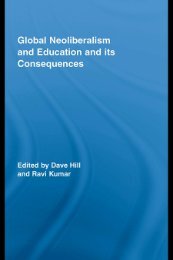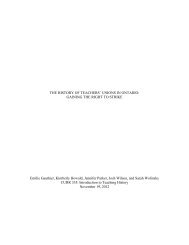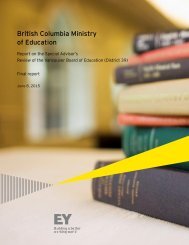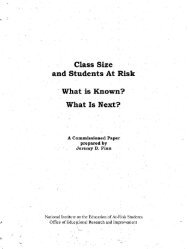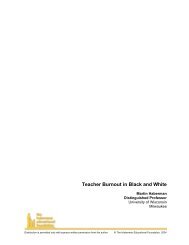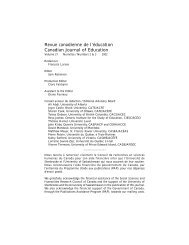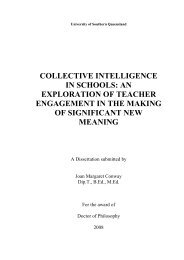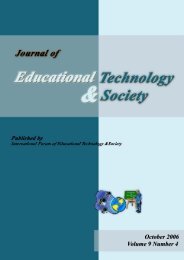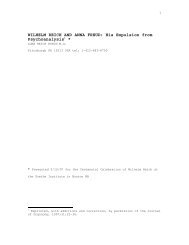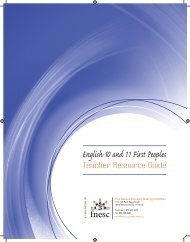Student Engagement: What do we know and what should we do?
Student Engagement: What do we know and what should we do?
Student Engagement: What do we know and what should we do?
Create successful ePaper yourself
Turn your PDF publications into a flip-book with our unique Google optimized e-Paper software.
“<strong>What</strong> <strong>do</strong> kangaroos eat?” The teacher, admitting that she did not <strong>know</strong> <strong>and</strong> assuring her<br />
students that she would get back to them later with an ans<strong>we</strong>r, was met with one student<br />
getting up from his seat <strong>and</strong> offering to find the ans<strong>we</strong>r online, ‘real quick’” (as cited in<br />
Barnes, et al, 2007a, p. 2). He was motivated, curious, <strong>and</strong> was not waiting for an<br />
authority to provide an ans<strong>we</strong>r when he knew he could find the ans<strong>we</strong>r on the Net, “real<br />
quick.”<br />
Carlson (2005) writes about a librarian who has studied young people to better<br />
underst<strong>and</strong> their learning preferences. He illustrates through sharing the findings of “Mr.<br />
S<strong>we</strong>eney,”:<br />
They have no br<strong>and</strong> loyalty. They “accept as their right” the ability to make<br />
choices <strong>and</strong> customize.<br />
They are more educated than their parents <strong>and</strong> expect to make more money. Many<br />
will change majors in school <strong>and</strong> expect to change jobs <strong>and</strong> careers.<br />
They like portability <strong>and</strong> are frustrated by technology that tethers them to a<br />
specific location. Playing with gizmos <strong>and</strong> digital technology is second nature.<br />
They <strong>do</strong>n’t read as much as previous generations did, preferring video, audio, <strong>and</strong><br />
interactive media.<br />
They multitask <strong>and</strong> are likely to mix work <strong>and</strong> play, playing a game or chatting<br />
while they are <strong>do</strong>ing an assignment.<br />
They <strong>we</strong>re pushed to collaboration, which explains the popularity of group study.<br />
Their collaboration is both in-person <strong>and</strong> virtual.<br />
They want to learn, but they want to learn only <strong>what</strong> they have to learn <strong>and</strong> they<br />
want to learn it in a style that works for them.<br />
Often they prefer to learn by <strong>do</strong>ing.<br />
The Millennials, or “digital natives” feel hemmed in by an educational system<br />
that continually looks to history, that <strong>do</strong>es not take young people seriously, <strong>and</strong><br />
that squelches creativity, a key characteristic of Millennials (Carlson, 2005, pp 3-<br />
4).<br />
Windham (2005) agrees. Ho<strong>we</strong>ver, she also suggests that these students need expert<br />
instruction because “the average student has no clue how to navigate or investigate the<br />
modern library. Instead, students increasingly rely on Web sites <strong>and</strong> Internet archives for<br />
information – increasing the likelihood that they will stumble across <strong>and</strong> cite false or<br />
incorrect information” (Windham, 2005, p. 5.9). <strong>Student</strong>s need to learn how to critically<br />
analyze the sources <strong>and</strong> quality of their “Google <strong>and</strong> “Wiki ans<strong>we</strong>rs. Brown (2002)<br />
also speaks about the critical need for the “new literacy” of information navigation:<br />
The new literacy, beyond text <strong>and</strong> image, is one of information navigation. The<br />
real literacy of tomorrow entails the ability to be your own personal reference<br />
librarian – to <strong>know</strong> how to navigate through confusing, complex information<br />
spaces <strong>and</strong> feel comfortable <strong>do</strong>ing so. Navigation may <strong>we</strong>ll be the main form of<br />
literacy for the 21 st century (p. 5).<br />
The literature agrees that students, their environments, their learning tools, <strong>and</strong> their<br />
preferences have changed dramatically. Some skills have surged to the forefront <strong>and</strong><br />
<strong>Student</strong> <strong>Engagement</strong>: <strong>What</strong> <strong>do</strong> <strong>we</strong> <strong>know</strong> <strong>and</strong> <strong>what</strong> <strong>should</strong> <strong>we</strong> <strong>do</strong>? 34



